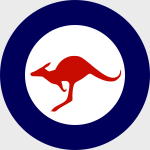Hobby Master HA3027 RAAF General Dynamics RF-111C Aardvark Strike Aircraft - A8-143, No.1 Squadron, Tindal, Australia, November 1999 (1:72 Scale)
"Videmus Agamus" ("Fighting First")
- Motto of No.1 Squadron
 The General Dynamics F-111 "Aardvark" is a medium-range interdictor and tactical strike aircraft that also fills the roles of strategic bomber, reconnaissance, and electronic warfare in its various versions. Developed in the 1960s and first entering service in 1967, the United States Air Force (USAF) variants were officially retired by 1998. The Royal Australian Air Force (RAAF) is the sole remaining operator of the F-111.
The General Dynamics F-111 "Aardvark" is a medium-range interdictor and tactical strike aircraft that also fills the roles of strategic bomber, reconnaissance, and electronic warfare in its various versions. Developed in the 1960s and first entering service in 1967, the United States Air Force (USAF) variants were officially retired by 1998. The Royal Australian Air Force (RAAF) is the sole remaining operator of the F-111.
The F-111 pioneered several technologies for production military aircraft including variable-sweep wings, afterburning turbofan engines, and automated terrain following radar for low-level, high-speed flight. Its design was influential, being reflected in later Soviet aircraft such as the Sukhoi Su-24, and some of its advanced features have since become commonplace. During its inception, however, the F-111 suffered a variety of development problems, and several of its intended roles, such as naval interception through the F-111B, failed to materialize.
In USAF service the F-111 has been effectively replaced by the F-15E Strike Eagle for medium-range precision strike missions, while the supersonic bomber role has been assumed by the B-1B Lancer. In 2007, the RAAF decided to replace its 21 F-111s in 2010 with 24 F/A-18F Super Hornets.
Pictured here is a 1:72 scale rendition of a RAAF General Dynamics RF-111C Aardvark strike aircraft that was attached to No.1 Squadron, then deployed to Tindal, Australia, during November 1999.
Sold Out!
Dimensions:
Wingspan: 12-1/4-inches
Length: 10-1/2-inches
Release Date: September 2021
Historical Account: "Father of the RAAF" - No.1 Squadron is a Royal Australian Air Force (RAAF) squadron headquartered at RAAF Base Amberley, Queensland. Controlled by No.82 Wing, it is equipped with Boeing F/A-18F Super Hornet multi-role fighters. The squadron was formed under the Australian Flying Corps in 1916 and saw action in the Sinai and Palestine Campaigns during World War I. It flew obsolete Royal Aircraft Factory B.E.2s, B.E.12s, Martinsyde G.100s and G.102s, as well as Airco DH.6s, Bristol Scouts and Nieuport 17s, before re-equipping with the R.E.8 in October 1917 and finally the Bristol Fighter in December. Its commanding officer in 1917-18 was Major Richard Williams, later known as the "Father of the RAAF". Disbanded in 1919, No.1 Squadron was re-formed on paper as part of the RAAF in 1922, and re-established as an operational unit three years later.
During World War II, the squadron flew Lockheed Hudson bombers in the Malayan and Dutch East Indies campaigns, suffering severe losses before being reduced to cadre in 1942. It was re-formed with Bristol Beauforts the following year, and re-equipped with de Havilland Mosquitos in 1945 for further operations in the Dutch East Indies. Reduced to cadre once more after the war ended, No.1 Squadron was re-established at Amberley in 1948 as an Avro Lincoln heavy bomber unit. From 1950 to 1958 it was based in Singapore, flying missions during the Malayan Emergency, where it bore the brunt of the Commonwealth air campaign against communist guerillas. When it returned to Australia it re-equipped with English Electric Canberra jet bombers. It operated McDonald Douglas F-4E Phantom IIs leased from the USAF from 1970 to 1973, as a stop-gap pending delivery of the General Dynamics F-111C swing-wing bomber. The F-111 remained in service for 37 years until replaced by the Super Hornet in 2010. In 2014-15, and again in 2017, a detachment of Super Hornets was deployed to the Middle East as part of Australia's contribution to the military intervention against ISIL.
General characteristics - Crew: 2 (pilot and weapons system operator)
- Length: 73 ft 6 in (22.4 m)
- Wingspan:
- Spread: 63 ft (19.2 m)
- Swept: 32 ft (9.75 m)
- Height: 17.13 ft (5.22 m)
- Wing area:
- Spread: 657.4 ft (61.07 m)
- Swept: 525 ft² (48.77 m²)
- Airfoil: NACA 64-210.68 root, NACA 64-209.80 tip
- Empty weight: 47,200 lb (21,400 kg)
- Loaded weight: 82,800 lb (37,600 kg)
- Max takeoff weight: 100,000 lb (45,300 kg)
- Powerplant: 2 Pratt & Whitney TF30-P-100 turbofans
- Dry thrust: 17,900 lbf (79.6 kN) each
- Thrust with afterburner: 25,100 lbf (112 kN) each
- Zero-lift drag coefficient: 0.0186
- Drag area: 9.36 ft² (0.87 m)
- Aspect ratio: spread: 7.56, swept: 1.95
Performance - Maximum speed: Mach 2.5 (1,650 mph, 2,655 km/h)
- Combat radius: 1,330 mi (1,160 nmi, 2,140 km)
- Ferry range: 4,200 mi (3,700 nmi, 6,760 km)
- Service ceiling: 66,000 ft (20,100 m)
- Rate of climb: 25,890 ft/min (131.5 m/s)
- Wing loading:
- Spread: 126.0 lb/ft (615.2 kg/m²)
- Swept: 158 lb/ft² (771 kg/m²)
- Thrust/weight: 0.61
- Lift-to-drag ratio: 15.8
Armament - Guns: 1 M61 Vulcan 20 mm (0.787 in) gatling cannon (seldom fitted)
- Hardpoints: 9 in total (8× under-wing, 1 under-fuselage between engines)
- Armament capacity: 31,500 lb (14,300 kg) ordnance mounted externally on hardpoints and internally in fuselage weapons bay
Bombs: - Free-fall general-purpose bombs
- Mk 82 (500 lb/227 kg)
- Mk 83 (1,000 lb/454 kg)
- Mk 84 (2,000 lb/907 kg)
- Mk 117 (750 lb/340 kg)
- Cluster bombs
- BLU-109 (2,000 lb/907 kg) hardened penetration bomb
- Paveway laser-guided bombs, including:
- GBU-10 (2,000 lb/907 kg)
- GBU-12 (500 lb/227 kg)
- GBU-28, specialized 4,800 lb (2,200 kg) penetration bomb
- BLU-107 Durandal runway-cratering bomb
- GBU-15 electro-optical bomb
- AGM-130 stand-off bomb
Wingspan: 12-1/4-inches
Length: 10-1/2-inches
|


